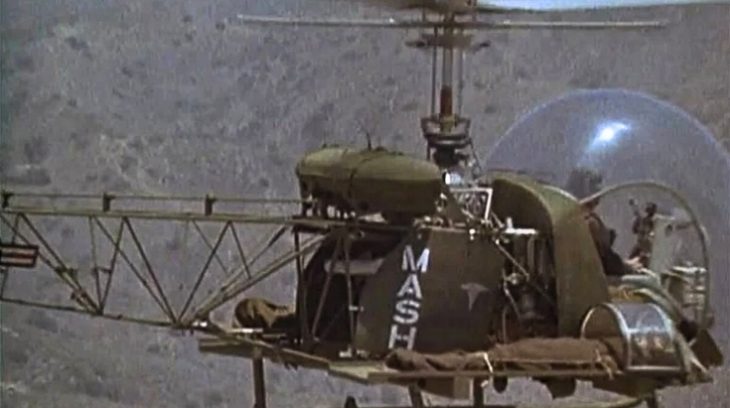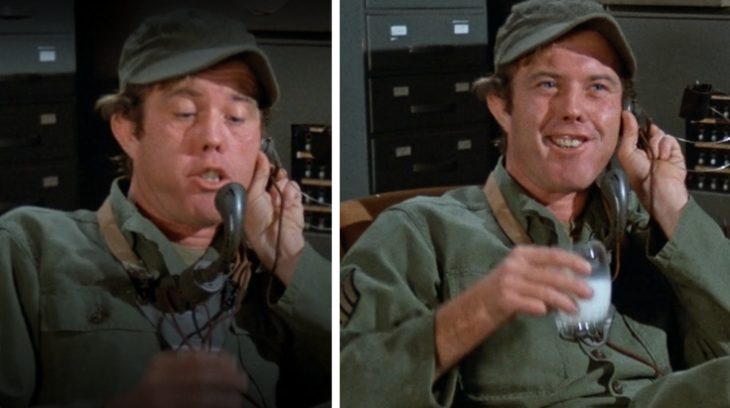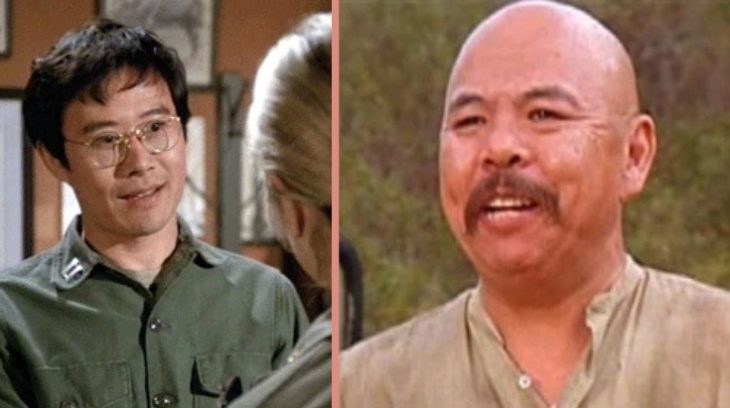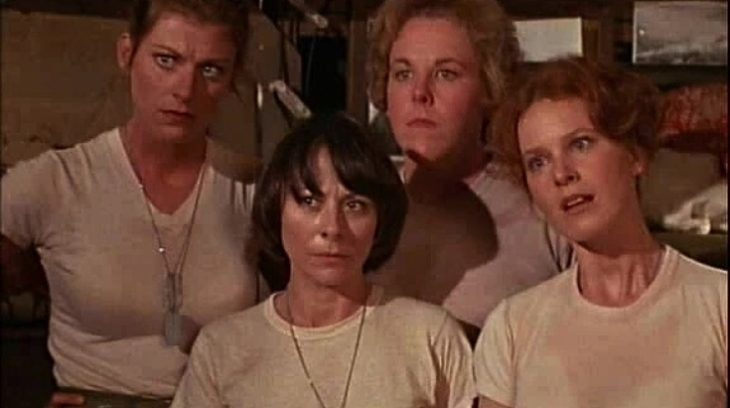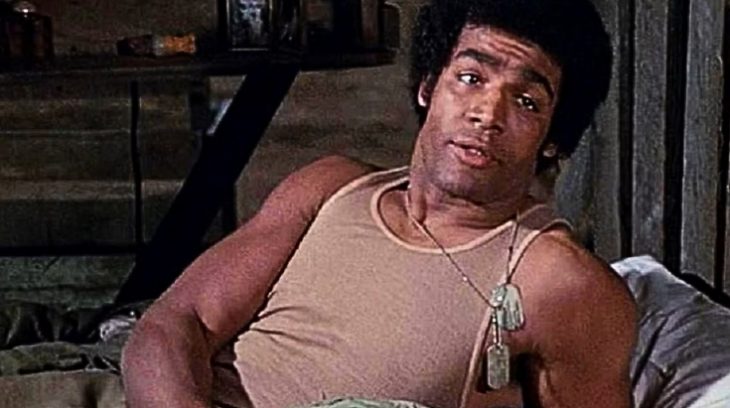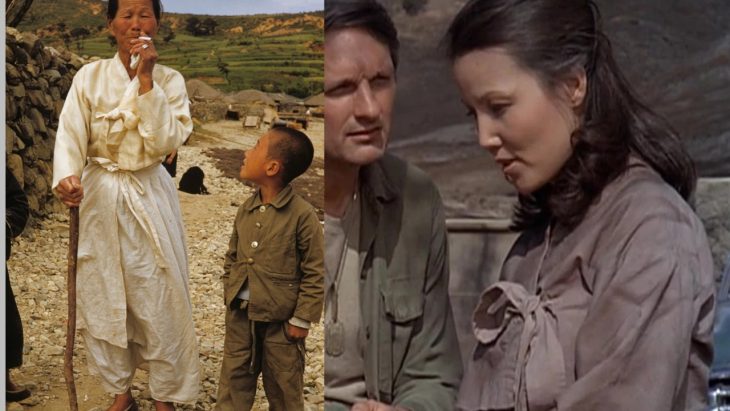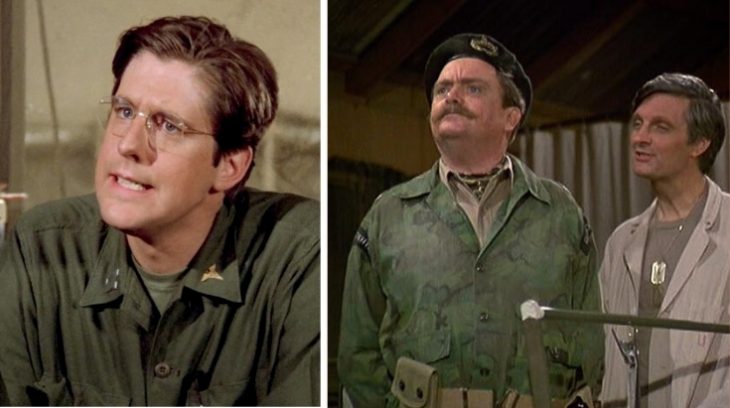If I’m not careful, this site could be construed as nothing more than a praise vehicle for MASH. To avoid this perception, this article is one of many to come about things the MASH TV show got completely wrong. I’m thinking of two things: The episode where the doctors made fun of Frank Burns for digging a foxhole and the ongoing portrayal of the MASH 4077th as being unfortified, unprotected, and devoid of guns or other weaponry. It’s as if the unit wasn’t situated in a war zone! No matter the attitude medical personnel may have had toward guns and the implements of war, MASH units had to be guarded, and yes, guns were needed for defense.

MASH 4077 General Lack of Security
In the early MASH seasons, guns were portrayed more often, but these occasions were simply plot devices for when Frank Burns assumed temporary command. He would have all the personnel line up in retreat formation with rifles so he could inspect them, and even had Igor Straminsky shoot off a signal cannon once, which ended up knocking Radar’s bugle out of his hand.
While we sometimes see military police guarding the roads leading to or from the MASH 4077th, we rarely see anything that could be construed as a defensive perimeter. MASH units did need to see to their own security, and it was often left to the doctors and other support people to figure out how to defend their camps.
MASH units in Korea absolutely required sentries and other means to detect the presence of incoming enemy troops and defend in the camps, if necessary. While Korean or Chinese troops rarely made their way to the medical units, it was not unheard of. Likewise, as depicted in the show, MASH units sometimes received mortar rounds within or around the camp.
A perimeter defense was not the only consideration. A MASH unit also needed interior defense, including defensive positions and protection from those occasional but deadly mortar rounds. This brings us to the first episode that I personally find to be an inaccurate portrayal of the situation, albeit a funny one.
While the MASH show did, at times, depict sentries, this was usually to serve the needs of an episode plot or simply to show Klinger on sentry duty in a dress. An example is Season 3, Episode 21, titled Big Mac, where Klinger is on sentry duty on the outskirts of the camp when a pair of officers arrive to announce the coming visit of General Douglas MacArthur. There is no other purpose to this scene but comedic effect, to show the officers’ reaction to seeing a guard in a yellow summer dress.
Season 5, Episode 8: Dear Sigmund – Frank Digs a Foxhole
Frank Burns is often made fun of for carrying a firearm and being paranoid about an enemy attack. While Frank Burns carrying a firearm is more of a danger to his colleagues than the enemy, it would not exactly have been paranoid to be fearful of an enemy attack while stationed only miles from the front line during the Korean War.
Medical officers did not often carry firearms in MASH units, except on special assignment, as depicted on MASH when the doctors were appointed “Officer of the Day.” So, Frank having a firearm, while not paranoid, was unusual. Some internet sources claim that the drafted medical doctors would have been trained on firearms and received a certification. However, such training was very brief, incomplete, and wholly inadequate when it occurred at all. Most of the doctors at MASH units would not have been proficient or truly familiar with the operation of firearms. They were permitted to carry them, though.
However, Frank Burns was also concerned with defending the camp against enemy attack by building defensive positions and digging trenches or foxholes. The MASH 4077th was portrayed as having almost no concern at all with camp defense. In reality, digging foxholes, trenches, or building any defensive positions deemed appropriate was not unusual. It was necessary. If an air raid occurred, these positions could save lives, and if an enemy attack happened, they could be used as protected positions from which to defend the camp.
In Season 5, Episode 8, titled Dear Sigmund, the psychiatrist Dr. Sidney Freedman, depressed and needing some kind of reset, visits the 4077th. He writes a letter to Sigmund Freud in which he calls the unit “a kind of spa,” saying, “the inmates have an interesting defense against carnage- insanity in the service of health.” He adds that Hawkeye is particularly adept at this. True to form, during Sidney’s visit, a serial prankster is at work in the camp.
During this visit from Sidney, Frank is convinced that an enemy air raid is imminent and has been busy digging several foxholes around the camp. Frank digs one of the holes just outside the Swamp.
Sidney discovers, to his surprise, that B.J. is the prankster when he finds the doctor filling Frank’s hole with water. B.J. asks Sidney if he wants to help, and when Sidney eagerly accepts, he instructs him to shout “Air raid!” at the top of his lungs. Sidney does so, and Frank, startled awake, runs out of the Swamp in a panic, trips over the low sand-bag wall, and falls into his water-filled hole, splashing and flailing comically.
Frank Burns Was Right
While the wisdom of placing a foxhole just outside your own quarters is questionable, digging foxholes, building sandbag walls, and seeing to other defensive fortifications of a MASH unit in Korea would have been neither paranoid nor unusual. Provided that the unit was in the same place long enough, which happened more often toward the end of the war, such defenses were built.
The MASH showrunners and writers, in pretending that MASH units were only concerned with medical care and put no thought toward their own protection, denied a harsh reality. It’s strange that a show that tried to depict the realities of war and the fact that the doctors put their lives on the line did so only occasionally. In fact, this depiction was the exception, not the rule. Occasionally, entire episodes were dedicated to depicting danger, while this ongoing and present danger was all but ignored in all the other episodes.
It would have been outside the bounds of comedy to depict the MASH 4077th as historically correct in every way. So, in fairness, it was not necessary to depict the MASH camp as being in imminent danger at all times. In fact, they were not. This was especially true during the latter half of the war, the time in which the show was set.
But, depicting the MASH unit as if it had no need for defense at all was, to me, strange. This was something that often knocked me out of the story. For all Frank’s bumbling, he was the only one who had enough sense to know that a unit situated near the front lines should be prepared for air raids or enemy attack.
Did MASH Units Have Guns?
If such an attack did occur, a MASH unit might need more than places to hunker down and hide. They might need guns. Big guns.
More than one episode of MASH is about Hawkeye’s aversion to firearms and his refusal to carry one or use one (example, Season 5, Episode 9, Hawkeye, Get Your Gun). MASH was a comedy and later a comedy-drama. Having characters walking around armed just wasn’t right for the show. As well, this fit the show’s anti-war message, something that differed from the original novel but was in keeping with the time period the show ran, after the Vietnam War, when Americans were disgusted with wars and America’s involvement in them.
When Frank carried a sidearm, or brandished one, including one belonging to a wounded Colonel he stole from the weapons locker, (Season 4, Episode 14, The Gun) it was depicted as verboten and almost unheard of.
It’s true that Frank Burns was quite likely to shoot one of his comrades, if not himself. In the forementioned episode, “The Gun,” were Frank steals a colonel’s prized weapon, he accidentally shoots himself in the foot while trying to return it. In Season 5, Episode 7, The Abduction of Margaret Houlihan, Frank shoots B.J. in the leg when loading his gun, intending to go out and find the missing Margaret. Fortunately, it’s just a nick.
But, while nobody wanted Frank to be armed, carrying a sidearm at a MASH unit, while not the regular, would not have been shocking.
Colonel Potter armed himself on occasion when venturing outside the camp. He also used his pistol to put a badly injured jeep out of its misery after Frank ran over it with a tank. The tank itself being in the camp was something that was portrayed as highly unusual and ridiculous, but needed because of sniper activity. This was not the only time that such a large weapon of war was present in the 4077 unit.
The MASH Tank Episode
The MASH episode featuring the tank in camp was Season 4, Episode 6, titled Hey, Doc. During this episode, the camp is being continually plagued by sniper fire. Meanwhile, among the many medical complaints Hawkeye and B.J. treat, one is from a visiting Colonel Griswald, who is a tank commander with the 1st Cavalry.
Griswald has stopped by the MASH to visit his wounded men, although with little actual sincerity. After a rudimentary visit with his soldiers, the colonel asks Hawkeye for help with a “delicate problem” that requires discretion. Namely, the officer doesn’t want any medical treatment he receives to appear on his service record. Hawkeye immediately understands that the colonel has been “bitten by the love bug” and has a case of “carnal flu.”
Hawkeye gives the colonel a shot of penicillin, and the colonel expresses his gratitude to Hawkeye for not putting anything in writing. He tells Hawkeye to let him know if the colonel can do anything for him.
After Colonel Griswald leaves, a British Lieutenant named Chivers returns to pay his debt to Hawkeye and B.J., two bottles of Scotch. This is the “going rate” for treating an ingrown toenail off the books. Ingrown toenails, at least in the fictional world of the show, are something the British military frowns greatly on since it takes footcare so very seriously. Therefore, it is not unusual for British offices to ask American doctors to treat their ingrown toenails on the sly. The price, according to the docs, is two bottles of scotch. The doctors had earlier taken care of Chivers’ foot, promising him that it would not appear on his official record.
Unfortunately, Hawkeye and B.J. never get to enjoy their Scotch, as sniper fire once again breaks out, and both bottles are shot and destroyed as the doctors take refuge under a truck. They go to Potter’s office. The commander isn’t too concerned about the snipers, saying, “We’re doing all we can. I’m working at my desk and Radar’s scared.” The docs show him the recently deceased Scotch bottles, and then a bullet comes through the window, narrowly missing the men.
“You know what would scare ’em away? Calvary! Today’s cavalry, a tank,” says Potter.
“Wait a minute, Colonel, let’s not us shoot off any cannons,” replies Hawkeye.
Potter answers, “No, no. Nothing like that. Just the sight of a tank would do it. It’s like having a big dog in your front yard. Works every time.”
Hawkeye remembers the favor that the tank commander, Griswald, owes him and has Radar contact him.
Griswald, at first, informs Hawkeye that he is very busy right now. To which Hawkeye replies, “Uh, Colonel, the above sniper fire is endangering all my private medical records. All of them. I just may have to put them in the official files for safekeeping, where anyone and his uncle can get a very good look at them.” After this extortion, the colonel agrees. When he delivers the tank, Griswald tells them they can have the tank for 24 hours, as it’s going in for maintenance. Hawkeye tells him that he’s “sorry about the bad news.”
“What bad news?” asks Griswald.
“All your medical records were destroyed in the last attack. Burned to a cinder.”
This inspires the commander to let them keep the tank for a week. “That’ll be enough to scare the North Koreans and both Chinas out of here,” he says.
Later, Frank, boasting about his tank experience to Margaret, gets in the tank, drives it around, loses control, and demolishes several tents. He then squashes Potter’s jeep before finally bringing the tank to a halt. Potter, who presumabley had been carrying his sidearm since the sniper attacks began, takes out his gun and shoots the jeep as if it is a wounded horse.
Hawkeye and BJ cover for Frank to get him to sign a paper discharging the supply sergeant, another episode subplot.
The MASH Episode With the Howitzer
Perhaps more inaccurate in its portrayal of the unit’s aversion to weaponry is Season 7, Episode 12, titled Dear Comrade. The subplot of this episode involves a sergeant from I Corps who is playing poker with Hawkeye, B.J., Margaret, and Charles in the Officers’ Club. Hawkeye has a great hand, but Sergeant Cimoli is convinced he is bluffing. Hawkeye raises again, and Cimoli, who is out of money, claims he can get a jeep and will bet said jeep against Hawkeye’s hand. Hawkeye accepts this offer and wins the hand with four nines against the sergeant’s full house (Jacks full of sevens).
Later on, a vehicle arrives, which Hawkeye believes to be his jeep. A howitzer is hitched to the jeep, however. To Hawkeye’s dismay, it turns out that the Howitzer, and not the jeep pulling it, is what Cimoli sent in payment of his poker debt because the gun is all he could get. Hawkeye has no idea what to do with the large and quite visible field weapon.
It is at this point that the show departs fully from historical reality. While receiving a howitzer in payment of a poker debt instead of a jeep is a good comedic element, Potter’s reaction to the weapon is, frankly, nonsensical.
When he sees the howitzer, Colonel Potter orders Hawkeye to get rid of it because the large gun will invite enemy fire. This makes no sense at all. Such a large weapon would dissuade random enemy fire, just as the presence of the tank was supposed to do. Why Potter should think a tank to be a good idea, “like a big dog in your front yard,” and yet think the howitzer was not, is in itself a character error. Beyond that, the idea that not having defensive weapons would make a MASH unit safer is a ridiculous notion.
In reality, the MASH 4077th, if it had existed, would have possessed, if not large field weapons like howitzers or cannons, machine guns mounted on jeeps, readied to defend the camp at all times. A relatively mobile howitzer would not have been a terrible addition to the inventory.
Indeed, much earlier on in the series, Frank had fired a 40mm anti-aircraft gun which he requested to defend the camp from a bomber (Season 2, Episode 2, Five O’clock Charlie).
In this episode, each day, the camp is being regularly flown over by an inept pilot in a plane that can barely fly. The pilot dubbed “5 O’clock Charlie” drops bombs that widely miss their target. His visits have become a camp event where everyone bets on how far away the bombs will land from their target, a weapons cache.
The One Where Frank Tries to Shoot Down 5 0’Clock Charlie
This episode is based on true occurrences during the Korean War where two-seater biplanes like the Soviet Polikarpov Pro-2 would be used to conduct nighttime raids to harass soldiers out of their bunks. The pilots would drop grenades or small bombs during the night, just after bed check. Similar harassment raids occurred during World War II.
Hawkey and Trapper are against Frank’s anti-aircraft gun, since they believe it will draw fire. Colonel Clayton, visiting for the festivities, also does not believe the gun is needed. Charlie manages to drop a bomb right on Clayton’s jeep, however, which changes his attitude.
Frank, who is positively gleeful over the proposition of shooting down 5 O’clock Charlie, forms a small unit of South Koreans whom he “trains” to fire the weapon. Meanwhile, Hawkeye and Trapper plot to get rid of the ammo dump, which is the reason for Charlie’s bombing raids. It is left to the imagination why a MASH unit that is allergic to weapons because they draw enemy fire has an ammo dump situated near the camp.
Hawkeye and Trapper concoct a series of giant arrows made out of sheets laid out on the ground to guide Charlie to the target. They then set the clocks in Post Op back by half an hour to make Frank think it’s 4:30 instead of 5:00, giving Charlie more time to complete his run.
Frank realizes Charlie is arriving, and he’s unprepared. He rushes outside to begin the firing sequence, and Hawkeye and Trapper shout out random numbers to confuse the South Koreans trying to set the weapon’s angle according to Frank’s instructions. Charlie manages to miss the ammo dump despite the help of the docs, but Frank succeeds, destroying it.
This episode is not the only time Frank fires a large weapon; another incident occurs in which Radar’s bugle is hit by an errant round.
In all such episodes, defensive weapons are portrayed as a last resort or even a completely ludicrous idea. Historically, speaking, having defensive weapons was completely necessary. Being stationed near the front lines and being concerned that the presence of large weapons would draw fire makes no sense as MASH units did not broadcast their location to the enemy, and every precaution was made to keep their location known only to allied forces.
If North Korean or Chinese soldiers found a MASH unit and wanted to attack, a defenseless camp would be a much bigger problem than a camp with a large gun that “drew enemy fire.” If anything, the presence of defensive weapons might dissuade such an attack, depending on the size of the enemy group and its armament.
Instead of accurately portraying the defending of MASH units, these anti-gun episodes were written in furtherance of the show’s general anti-military (bureaucracy) and anti-war stance. This positioning somewhat mellowed during the later seasons, especially the anti-military portion. In reality, MASH units not only had guns, they were ready to use them when necessary.

